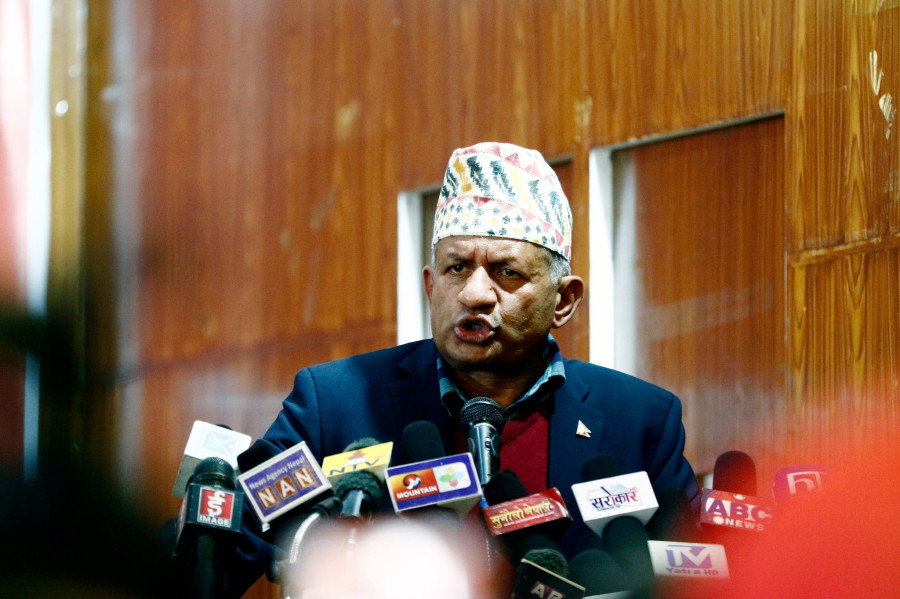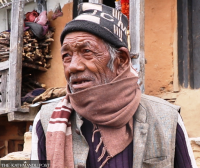National
All eyes on Foreign Minister Gyawali’s Delhi visit for Nepal to procure Covid-19 vaccines
Government has placed all bets on vaccines being manufactured in India because of logistical issues but experts warn that other avenues must also be explored.
Anil Giri & Arjun Poudel
With the coronavirus vaccine becoming a “political commodity”, to use the words of a minister, the government is hoping that there will be a breakthrough in talks with India for Nepal to procure vaccines before Foreign Minister Pradeep Gyawali’s Delhi visit later this week.
“We think that we will get vaccines for about half a million people from India as a goodwill gesture,” said an official at the Prime Minister’s Office familiar with the matter, who wished to remain anonymous because he was not allowed to talk to the media.
Nepal is looking to procure vaccines to inoculate 12 million in the first phase and India is the preferred source, according to Minister for Health and Population Hridayesh Tripathi.
“But we are also aware that the vaccine has become a political commodity today,” Tripathi told the Post. “We are making utmost efforts to procure the Covid-19 vaccine and are in touch with several producers and countries but we have not reached a stage to sign a deal with anyone yet.”
Talks with India are at an advanced stage, according to Tripathi.
Earlier the government had sent separate diplomatic notes to the countries that are producing Covid-19 vaccines but it has given priority to the vaccine produced in India because of reasons like logistics, pricing and India’s assurance to facilitate procurement.
Serum Institute of India, the world’s largest maker of vaccines, is producing Covishield, developed by Oxford University of the United Kingdom and drugs giant AstraZeneca.
Nepal’s Ambassador to New Delhi Nilamber Acharya has held two rounds of talks with senior officials of the Pune-based Serum Institute of India and met senior officials of Bharat Biotech in order to speed up the vaccine procurement, according to officials.
Bharat Biotech is developing its own vaccine.
“Both Indian firms have already assured us to provide the Covid-19 vaccine, shared the price list, and clinical and technical details,” said the official at the Prime Minister’s Office. “But the government has yet to reach an agreement because it is looking for a government-to-government deal which at this stage is not possible.”
According to an official at the Nepali Embassy in New Delhi, the vaccine being manufactured by Serum Institute of India is more affordable than the one from Bharat Biotech.
“It is now up to Kathmandu to take a decision as India will be rolling out the Covid-19 vaccine from January 16,” the official, who also did not wish to be named as things are just at the preliminary stage, told the Post.
Foreign Minister Gyawali has also written two separate letters to his Indian and Chinese counterparts—S Jaishanker and Wang Yi—regarding the Covid-19 vaccine, according to Foreign Ministry officials.
“Although efforts are on to procure vaccines from China, more priority is given to India due to medical and clinical reasons,” said a Foreign Ministry official who too did not wish to be named.
Dr Roshan Pokhrel, chief specialist at the Ministry of Health and Population, said that Nepal’s focus will be on procuring Covishield manufactured by Serum Institute of India
“If the vaccines developed by Oxford University and AstraZeneca are not possible, we will see another option—Covaxin, which is developed by Bharat Biotech,” said Pokhrel.
Both vaccines had recently received emergency use approval in India although the data of phase III trials of Covaxin has not yet been reviewed.
But officials at the Health Ministry have warned that India may make Covaxin available to Nepal rather than Covishield that Nepal prefers.
India plans to roll out coronavirus vaccines by this week. But with India’s large population, public health experts doubt Nepal will get AstraZeneca’s vaccine, as the Indian authorities have barred Serum Institute from exporting the Covishield vaccine, until India has sufficient doses for its people.
According to them, the Indian authorities could persuade the Nepali side to procure Bharat Biotech’s vaccine.
“They can even convince by providing a few thousand doses free of cost and ask that the rest be purchased and could charge more later,” an official at the Health Ministry told the Post, asking not to be named. “Such a deal will not benefit us. Neither will we get quality products nor will we get concessions in price.”
The official said that if the first dose of vaccine is provided free of cost and the government has to pay for the second dose, it does not make any sense and authorities have to buy second doses from the same company.
Vaccines have to be administered in two doses within a gap of 21 days.
The Child Health Section at the Family Welfare Division under the Department of Health Services said that training for health workers about the inoculation will start only after a deal is signed between the companies and government.
“Without knowing which vaccine will come, we cannot start training for health workers,” Dr Jhalak Sharma, chief of the section, told the Post. “Once the deal is signed, we will start the training accordingly.”
Besides the tested efficacy of Covishield that has been found to be 70 percent effective after two full doses, Nepal’s existing storage system supports it too.
“I too understand that the government is trying to procure Covishield developed by Oxford group,” Dr Shyam Raj Upreti, coordinator of Covid-19 vaccine advisory committee, told the Post. “Our existing storage system supports AstraZeneca's vaccine.”
The existing vaccine storage system in operation throughout the country can store vaccines between 2 and 8 degrees Celsius, the temperature needed to transport and store the Covishield vaccine.
“We should try to acquire AstraZeneca’s vaccine and make deals with the manufacturing companies directly for procurement,” Dr Mingmar Gyelgen Sherpa, former director general at the Department of Health Services, told the Post. “We know that no vaccine manufacturing company can provide vaccine sufficient for all citizens at once, we should try to get quality products.”
According to the official from the Prime Minister’s Office, Nepal is also holding talks with the Indian government to facilitate vaccine procurement and transport process.
“We are in talks with the Indian government so that it can facilitate the procurement and transport of the vaccine,” said the official. “Our panel of experts has also recommended the AstraZeneca vaccine.”
The government has formed committees to acquire coronavirus vaccines including a high level committee of secretaries–health secretary, finance secretary and foreign secretary.
Last month, the government had sought India’s help to procure coronavirus vaccine sufficient for the 20 percent population, who are at high risk.
The Cabinet has estimated that Rs 48 billion would be required to inoculate 52 percent of the population.
While the World Health Organisation’s COVAX programme will provide vaccines for 20 percent of the population, children under 15 years of age who constitute 28 percent of the population, can’t be immunised as vaccines haven’t been tested on them.
Experts believe that success in getting vaccines during the time of pandemic lies in diplomacy too.
“Providing vaccines to Nepal will not be a big deal for a country like India,” Dr Sameer Mani Dixit, director of research at the Centre for Molecular Dynamics-Nepal, told the Post. “It is an opportunity for both India and Nepal to improve the bilateral relationship, which remains strained for some time.”




 10.12°C Kathmandu
10.12°C Kathmandu














